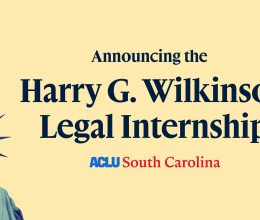
As Harry G. Wilkinson prepared to graduate from the University of Chicago Law School in 1961, he looked out at a world in turmoil and chose a path for his life.
“I had decided that I didn’t want to work for a large Wall Street firm, as did many of my colleagues,” he would later write. “I was more idealistic and wanted to change the world.”
Today on the blog, we are celebrating the life and career of the late Harry G. Wilkinson, a former ACLU of South Carolina board member whose family's gift in his memory will launch a paid internship program for law students aspiring to practice civil rights law in South Carolina. We are now accepting applications for the summer 2026 Harry G. Wilkinson Legal Internship, with a deadline of November 15.
Born in Detroit in 1932, Wilkinson chose an adventurous path in life. After joining the military in 1953 and being stationed at an Air Force base in England, he completed law school and then worked as a lawyer representing unions in Washington, D.C., where he wrote his first Supreme Court brief. He worked in Congressional committees drafting legislation to improve migrant labor conditions, protect people with mental illness, and provide legal assistance to those who couldn’t afford it.
Wilkinson later served as deputy director of the Community Relations Service, set up under the 1964 Civil Rights Act to serve communities during the transition to a more inclusive democracy. The job took him to Bogalusa, Louisiana, where he helped broker peace and prevent violence by local Ku Klux Klan members during the racial integration of a state fair.
After a stint with the U.S. Labor Department, Wilkinson began traveling the world as a leader in the Peace Corps, including assignments in Ethiopia and Costa Rica. He later served as a foreign service officer with the U.S. Agency for International Development (USAID). The work took him to South Africa during the final years of apartheid, where he retired and then worked with Lawyers for Human Rights of South Africa.
Wilkinson's wife Cecily Mango, who also worked for USAID in South Africa at the time, remembers living through a time of radical change, especially following the release of Nelson Mandela from prison in 1990. Through it all, she said, her husband lived out a commitment to public service and a belief that government could change people’s lives for the better. She remembers him as a sharp legal mind, an adventurous athlete who supported the arts, and a man who could talk to anybody about anything.
"I think in general, he just genuinely liked people and wanted to understand where they were coming from,” Mango said.
Wilkinson and Mango retired to Greenville, South Carolina, where Wilkinson served on the Board of Directors of the ACLU of South Carolina. After Wilkinson’s passing in 2020, Mango carried forward his lifelong support for civil rights, culminating in the creation of a paid, full-time, 10-week summer internship named in Wilkinson’s honor. The Harry G. Wilkinson Legal Internship represents a commitment to the training of future South Carolina lawyers, with preference given to applicants who attend law school in South Carolina.
“I think he would be very happy to know that there are people, young lawyers, who are interested in pursuing a career in public interest law,” Mango said. “He certainly felt it was incredibly important, and I think he would be gratified to feel that there were people coming behind him to take up the fight.”
Are you interested in supporting the work of the ACLU of South Carolina? You can reach out to our Development Director, Nick Mercer, or make a donation at aclusc.org/donate.
For more information about the summer 2026 Harry G. Wilkinson Legal Internship and the 2026 ACLU-NBLSA Southern Legal Internship Program, which are both currently accepting applications, visit our Careers page.
